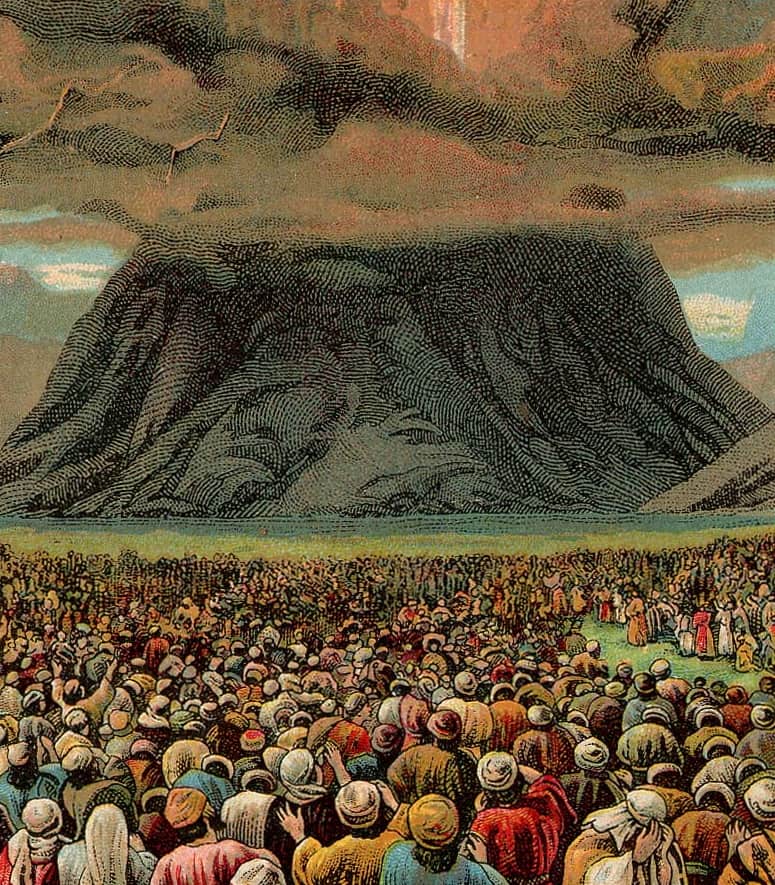1 And God spoke all these words, saying:…
13 Thou shall not murder.
— Exodus 20:1,13 (NKJV)
What is the meaning of “You shall not murder.”
Our site typically uses the King James Version of the Bible, however in this case it will be important to look at other word-for-word translations that use the English word murder instead of kill, which is a more accurate translation from the Hebrew word rāṣaḥ to murder, slay, or kill.
So this means what it says, do not murder.
This law was always in effect since creation, as seen by God’s reaction to the first murder of Abel by Cain (Genesis 4:1–16).
However, Jesus magnifies it further, instructing us in what the spirit of the commandment is.
Jesus said to the multitudes and disciples on the mountain:
21 Ye have heard that it was said by them of old time, Thou shalt not kill; and whosoever shall kill shall be in danger of the judgment:
22 But I say unto you, That whosoever is angry with his brother without a cause shall be in danger of the judgment: and whosoever shall say to his brother, Raca, shall be in danger of the council: but whosoever shall say, Thou fool, shall be in danger of hell fire.

This isn’t to say you should never get angry. That would be impossible. The Bible talks about how we should be slow to become angry (James 1:19-20) and that we shouldn’t be angry without cause. If we are angry we should solve it that same day and not leave room for the devil to turn our anger into something worse (Ephesians 4:26). Otherwise our anger might fester and cause us to kill like Cain (Genesis 4:2-8). The Bible also talks about righteous anger or indignation sometimes being justified, as we do not want to have indifference or hardened hearts to sin. Even righteous anger should be controlled or it will make us fools and cause us to sin.
The Bible also teaches us against violence. Acts of violence are against God’s character and the path Jesus set as our example. This includes committing acts of violence and violence for entertainment. Here is a popular verse from Him:
38 Ye have heard that it hath been said, An eye for an eye, and a tooth for a tooth:
39 But I say unto you, That ye resist not evil: but whosoever shall smite thee on thy right cheek, turn to him the other also.
40 And if any man will sue thee at the law, and take away thy coat, let him have thy cloke also.
Are there exceptions to the 6th commandment?
- Misconception: Moses’ civil law and Hebrew law throughout the Old Testament sentenced criminals to capital punishment, and still applies today. Eye for an eye. That makes capital punishment still righteous today because criminals must pay the punishment for their crimes. Truth: Moses’ civil law influenced many governments today and throughout history. However, Moses’ civil law was part of a theocracy back then, and we are not part of that theocracy today. The Bible does say the wage of sin is death (Romans 6:23). This wage is called the second and permanent death (Malachi 4 & Revelation 21:8), the death of the body and soul burned up to ash at the final judgment day, after the thousand-year millennial reign of Jesus Christ. However, this wage is ordained by God, not by us. It is not our place or our authority to usurp God or act for Him unless told by God.
- Misconception: Self-defense that results in death is not allowed. Even if it was done only for self-defense, it is not OK to kill them. Truth: Those who live by the sword, die by the sword (Matthew 26:52). We should go by Jesus’ example. However, nowhere in the Bible does it say self-defense is the same as murder. It is clearly viewed as different acts. The Bible has instances of self-defense and other instances of God’s people purposely not using self-defense, as a way to be a witness in their faith in God.

- Misconception: Proactive military offenses and attacks were used and commanded by God in the Bible. Thus holy wars, genocide, and such in the name of God are OK. Truth: The term “holy war” is not a Biblical term, but a man-made one which revolves around man deciding who to kill for God. The Bible is very clear that God is who has the authority to make judgments, not man. God’s judgments came after great long patience from His mercy on peoples with prolific and awful sin that threatened His people and covenants with them at those specific times. Jesus Christ clarifies this with a command to love your enemies (Matthew 5:44) and talks about not using force. The ancient theocratic rule does not justify modern religious mandates by men. Such justifications misapply Biblical precedent. Previously in the Old Testament, there were times when God offensively and defensively called for and aided in battles for His people. His people at these times were following God. When they stopped following God, then He could not support their theocratic rule anymore. And today no nation is backed by God like in the Old Testament Israel. God still sets up and takes down kingdoms (Daniel 2:1), but His kingdom will not rule until Jesus’ Second Coming.
- Misconception: Abortion of viable fetuses, fertility treatments that result in discarded embryos, and emergency contraception that may prevent implantation of embryos are not killing, because human embryos and fetuses are not yet babies or have individual human rights until they reach a certain stage of development or are born. Truth: No doubt these are difficult situations and we should be compassionate. We cannot judge others’ circumstances, nor should we broadly judge all who might be in such a situation, but follow Jesus Christ with biblical loving support and encouragement with the Word of God (the Bible). Some biblical passages we should not ignore: God created mankind in His image (Genesis 1:27; 2:7), gave us His Spirit of life (Romans 8:2), and gave His only Son for all mankind, even those not born yet (John 3:16). The sanctity of life goes further as God describes the knowledge of people before they were conceived (Psalm 139:16; Isaiah 49:1, 5; Jeremiah 1:5; Galatians 1:15; Luke 1:15). In certain cases, God directly guided prenatal life like Samson (Judges 13:3-5). Biblical law shows a strong regard for the value of human life and considers harm to or the loss of a baby or mother as a result of a violent act a serious issue (Exodus 21:22-23). The biblical law also says neither shall the children be put to death for the fathers: every man shall be put to death for his own sin (Deuteronomy 24:16). Jesus in his life showed compassion to all, seeing each person’s life is precious to God, healing all manners of health issues, deformities or maladies.
Other situations to consider are suicide, assisted suicide, or euthanasia. Which may be consensual, but are also extremely unfortunate situations that God never intended. And that there are other options available to help.
Where did the Sixth Commandment come from?

After God (using Moses) liberated His people from slavery in Egypt, God instructed them on how to live as a society under His rule. God, in a thick cloud from the top of Mount Sinai, spoke as a loud trumpet His laws so that Israelite people would know how to not sin, how to love God, and love their neighbors as themselves (Matthew 22:37-40).
These laws are called the Ten Commandments or the Law of Liberty (liberty from sin). Learn more about the Ten Commandments.
Related Questions:
- Is the sixth commandment do not kill or do not murder?
- Is it a sin to kill animals?
- What does the Bible say about self-defense?
- Does the Bible say abortion is murder?
- Does the Bible support abortion?
- What does the Bible say about preventing pregnancy?
- What if a Christian gets conscripted or goes into a military conflict?
- Should Christians be conscientious objectors to military service?
- Should Christians own a gun or have a weapon?
- Does the Bible allow the death penalty or capital punishment?
- What are the different types of capital punishment in the Bible?
- Does God want capital punishment from Christian nations?
- What does the Bible say about punishment for crimes?
- Should Christians be against the death penalty?
- If murder is wrong, why does God kill people and have holy wars?
- Why is God so vengeful, especially in the Old Testament?
- Does God let Satan and the fallen angels kill people?
- Why is the punishment for sin death?
Our Adventist Life is a dedicated online evangelist and mother of two, deeply rooted in her Seventh-day Adventist faith. With over 15 years of experience in creating and optimizing digital content, she brings a unique blend of professional expertise and spiritual insight to her work. Her passion lies in exploring Biblical truths and their practical applications in daily living, self-care, and family nurturing. Through her writing, she aims to inspire and guide her readers toward a more fulfilling Christian lifestyle, drawing from her own experiences as a parent and a follower of Christ. Her thoughtful and engaging content reflects her commitment to sharing the love and wisdom found in the Scriptures with a modern audience living in the end times.




Leave a Reply